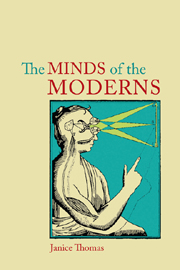Book contents
- Frontmatter
- Contents
- Acknowledgements
- Abbreviations
- Introduction
- I Descartes
- 1 Does Descartes think minds are substances?
- 2 Descartes on self-knowledge
- 3 Human consciousness and the rational soul
- 4 Mental causation
- 5 Mental representation
- II Spinoza
- III Leibniz
- IV Locke
- V Berkeley
- VI Hume
- Conclusion
- Bibliography
- Index
3 - Human consciousness and the rational soul
from I - Descartes
- Frontmatter
- Contents
- Acknowledgements
- Abbreviations
- Introduction
- I Descartes
- 1 Does Descartes think minds are substances?
- 2 Descartes on self-knowledge
- 3 Human consciousness and the rational soul
- 4 Mental causation
- 5 Mental representation
- II Spinoza
- III Leibniz
- IV Locke
- V Berkeley
- VI Hume
- Conclusion
- Bibliography
- Index
Summary
A misleading interpretation
Descartes has often been portrayed as restricting consciousness of all kinds to those animals that possess rational souls, that is, to human beings. Supporting this conclusion is the claim that Descartes regards consciousness as equivalent to thought and also that he always gives the verb cogitare a much wider sense than that of the English verb “to think”. According to this view, Descartes includes in “thinking” not only the having of sense perceptions and feelings like pains but even the sensations of walking and of uttering something aloud. So this interpretation sees Descartes as equating consciousness with thoughts, that is, mental states of all sorts, which, therefore, because these all require a rational soul, human beings alone can experience.
There is so much in this that is wrong, seriously misleading or both that it is difficult to know where to begin in trying to correct it. For a start, it assumes Descartes has a clear, unequivocal sense or meaning for the term “consciousness” (and that we can be certain what that meaning is). In fact, the term “consciousness” is very rarely to be found anywhere in Descartes's writings and, crucially, in talking about the distinction between human beings and other creatures Descartes never uses the term “consciousness”. So anyone wishing to defend the view that Descartes restricts consciousness to beings possessed of rational souls (and to the operation of those souls) owes us a great deal of supporting argument that is seldom to be found in writings where this conclusion is asserted.
- Type
- Chapter
- Information
- The Minds of the ModernsRationalism, Empiricism and Philosophy of Mind, pp. 31 - 41Publisher: Acumen PublishingPrint publication year: 2009

